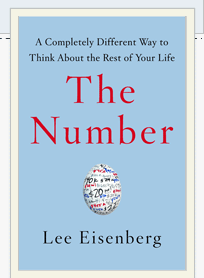|
|
|
|
|
|
|
|
|

 |
||
|
|
||
|
|
|
|
|
|
Excerpts: Chapter 1 | Chapter 3 | Chapter 8 | Chapter 14
Chapter 3
The Eisenberg Uncertainty Principles have to do with things we could change if we had the will, or knew how:
1. The uncertainty that results from living in a society and culture so steeped in the moment, and awash in debt, that there's little social or peer pressure to get one's financial house in order.
Easy credit makes it easier to spend than to save, more pleasant to shop than to plan. We throw money around. We piss it away. We treat ourselves to new shoes or a smart phone when we're feeling blue. The Wall Street Journal recently reported that since 1990, median household income has risen 11 percent, adjusted for inflation; median household debt, on the other hand, has risen 80 percent. Consuming is all-consuming, a full-time job unto itself. Who has time to gather expenses onto a budget worksheet, even if the budget is designed to restrain us?
2. The uncertainty and lack of motivation that come from not knowing how money works. Doing money right is not a core competency for most people. This is either a baffling irony or a natural consequence of a materialistic culture. People feel stupid about money, so they keep it at arm's length, sometimes for decades (call these the Lost Years, which we'll get to). People may be OK when it comes to earning money and quite adept at spending it, but a great many of them confess to feeling clumsy, myopic, and highly inept when it comes to managing it. Surveys bear this out. Many of them indicate that even educated and professionally successful people don't know the basics, e.g., that a money-market fund isn't made up of stocks; or that the value of a bond goes down when interest rates go up. Not knowing the fundamentals is definitely a roadblock to proactive planning.
3. The uncertainty caused by knowing that the old retirement support systems are withering away. Until recently it was fairly simple to live and pay for a lifetime on the planet. You worked, you retired, and you died shortly thereafter, in more or less dutiful compliance with accepted timetables of the day. There were reliable systems in place to finance your retirement. Most people knew exactly how much money would arrive in their mailboxes every month, and it always arrived as promised. For a host of reasons (we'll get to these, too) it doesn't work that way anymore.
4. The uncertainty caused by the immense cloud that hangs over future retirement benefits: bankrupt corporate pension plans; what an angry stock market god might do to smite private retirement savings plans. This uncertainty thrives like mold in the brave new petri dish of financial self-determination. Just as we scratch our heads over where yesterday's security went, we have too little faith in tomorrow's. Companies implode and take our benefits with them; others try to chisel their way out of old commitments or simply find they can't fulfill them. United Airlines recently won a court ruling in the largest pension-default case ever. Its pension fund was short nearly $10 billion, only half of which was insured by a government agency. The government agency itself is going broke. Then there's that little matter of Social Security.
5. The uncertainty that comes from failure to see the larger picture in all of the above. It would be helpful to have trustworthy teachers, mentors, and financial counselors who are accessible to everyone, no matter how rich or poor. Financial life is wildly confusing, fraught with subjectivity and arbitrary calls. There are too many decisions and choices to be made, lots of arcane minutiae to juggle. There is endless fine print and gobbledygook about estate planning, tax codes, disbursement strategies. Not to mention the fact that those damn politicians down in Washington are always changing everything around in bizarre ways. It's like a bad stand-up routine. Sunset provisions! Are they nuts, folks, or what? Taxes recede, expire, then come back as if they'd never gone away-unless, of course, they get changed in the meantime, which they probably will be, but who knows where or when? How can anybody plan amid all the confusion and static?
6. Finally, the profound uncertainty over what truly matters at the end of the day. Let's assume that you're lucky or smart enough to navigate the foregoing uncertainties. Having gone to so much trouble, do you really want to wake up one morning, throw open the shutters on a glorious day, gaze at the dewy rose garden below, and watch the sun rise on the rest of your life, screaming, "I'm so wrinkled, miserable, and bored I wish I was dead"? The greatest uncertainty of all may be the uncertainty over what money is good for. We bury this uncertainty under a million clichés. Money can't buy happiness. Oh, no? Money can buy time and opportunity to do the things we most love. It can help us fulfill our obligations as parents to our kids and as kids to our parents. It buys quality health care. But somehow or other, we get our knickers all twisted up when it comes to figuring out the real value of money. Could it be that in the end the reason we don't plan is because we don't have anything meaningful to plan for?